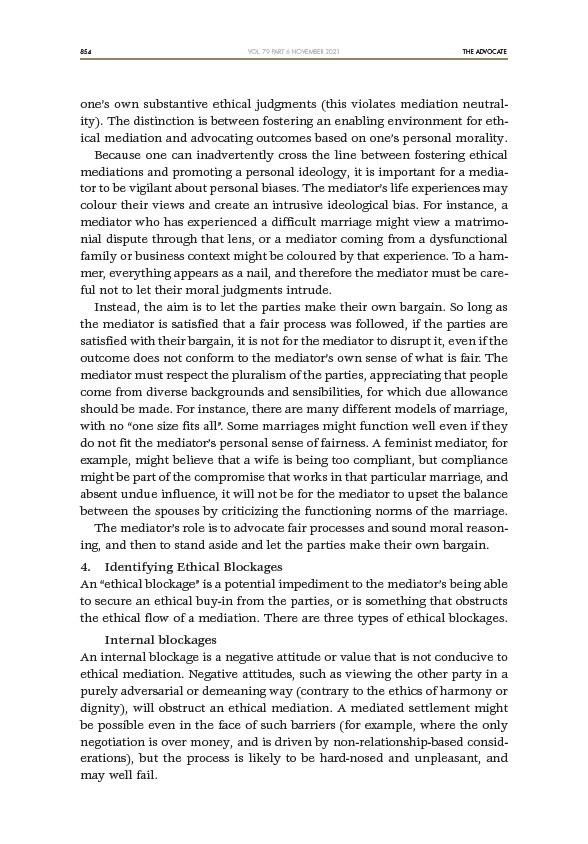
854 THE ADVOCATE
VOL. 79 PART 6 NOVEMBER 2021
one’s own substantive ethical judgments (this violates mediation neutrality).
The distinction is between fostering an enabling environment for ethical
mediation and advocating outcomes based on one’s personal morality.
Because one can inadvertently cross the line between fostering ethical
mediations and promoting a personal ideology, it is important for a mediator
to be vigilant about personal biases. The mediator’s life experiences may
colour their views and create an intrusive ideological bias. For instance, a
mediator who has experienced a difficult marriage might view a matrimonial
dispute through that lens, or a mediator coming from a dysfunctional
family or business context might be coloured by that experience. To a hammer,
everything appears as a nail, and therefore the mediator must be careful
not to let their moral judgments intrude.
Instead, the aim is to let the parties make their own bargain. So long as
the mediator is satisfied that a fair process was followed, if the parties are
satisfied with their bargain, it is not for the mediator to disrupt it, even if the
outcome does not conform to the mediator’s own sense of what is fair. The
mediator must respect the pluralism of the parties, appreciating that people
come from diverse backgrounds and sensibilities, for which due allowance
should be made. For instance, there are many different models of marriage,
with no “one size fits all”. Some marriages might function well even if they
do not fit the mediator’s personal sense of fairness. A feminist mediator, for
example, might believe that a wife is being too compliant, but compliance
might be part of the compromise that works in that particular marriage, and
absent undue influence, it will not be for the mediator to upset the balance
between the spouses by criticizing the functioning norms of the marriage.
The mediator’s role is to advocate fair processes and sound moral reasoning,
and then to stand aside and let the parties make their own bargain.
4. Identifying Ethical Blockages
An “ethical blockage” is a potential impediment to the mediator’s being able
to secure an ethical buy-in from the parties, or is something that obstructs
the ethical flow of a mediation. There are three types of ethical blockages.
Internal blockages
An internal blockage is a negative attitude or value that is not conducive to
ethical mediation. Negative attitudes, such as viewing the other party in a
purely adversarial or demeaning way (contrary to the ethics of harmony or
dignity), will obstruct an ethical mediation. A mediated settlement might
be possible even in the face of such barriers (for example, where the only
negotiation is over money, and is driven by non-relationship-based considerations),
but the process is likely to be hard-nosed and unpleasant, and
may well fail.